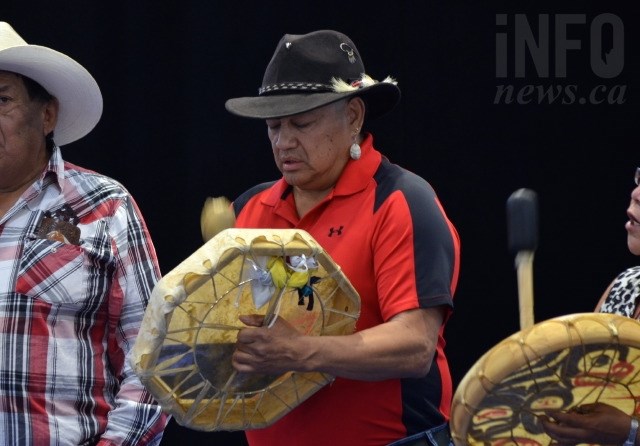
FILE PHOTO: Splatsin Chief Kukpi7 Wayne Christian.
(CHARLOTTE HELSTON / iNFOnews.ca)
March 10, 2017 - 11:22 AM
KAMLOOPS - First Nations elders and chiefs have declared a state of emergency over the deadly fentanyl crisis.
Splatsin First Nation Chief Kukpi7 Wayne Christian says the powerful opioid is having a devastating effect in communities across the Secwepemc Nation, which includes the Tk’emlups Band in Kamloops, the Adams Lake Indian Band in Chase, the Splatsin in Enderby and the Neskonlith Indian Band around Chase and the outskirts of Salmon Arm.
“What’s happened is in the past three months, there’s been quite a few deaths in our communities,” Christian says. “In the Chase area in one month, there were four to five burials. A significant number of those were overdoses.”
The Secwepemc Elders Council has declared a Nation State of Emergency and is calling on local chiefs for immediate action to address the growing epidemic. The declaration comes shortly after the presence of carfentanil — an extremely potent opioid — was confirmed in the Interior Health Authority region.
In response, the Chiefs of the Shuswap Nation Tribal Council, of which Christian is a member, are now calling on the First Nations Health Council, Interior Health Authority, RCMP and all other available resources to “work with us in joint partnership and fill any gaps which are contributing to this growing crisis.”
Personally, Christian knows two people who passed away due to a drug overdose, and he says 20 per cent of overdose deaths in the Interior Health Authority region are First Nations individuals.
“It’s quite alarming,” Christian says. “It’s quite a significant number of families and children being affected.”
He says the high percentage of First Nations people falling victim to the overdose crisis stems from trauma suffered in residential schools and the 60s Scoop, a period of time when a large number of children were taken from their homes and placed in foster care.
While he would like to see more of an emphasis from the federal government on stopping fentanyl from entering Canada, he says the focus at the local level is education.
“It is important that all members within our communities are given the resources needed to be adequately informed on the issue of fentanyl. Prevention and awareness are critical for our members, their families, and the community to effectively combat this crisis,” Christian says in a tribal council release from March 9.
He says immediate action is needed to inform citizens of the presence of fentanyl in street drugs, the symptoms and probability of overdoses, and the treatment options available.
“Addictions do not discriminate and this fentanyl crisis is deadly as it takes live regardless of age and with only one time use. Get educated on how to prevent this from killing your loved ones,” Christian says.
He encourages people to pick up a free Naloxone kit, which can be used to reverse the effects of an overdose.
To contact a reporter for this story, email Charlotte Helston or call 250-309-5230 or email the editor. You can also submit photos, videos or news tips to the newsroom and be entered to win a monthly prize draw.
We welcome your comments and opinions on our stories but play nice. We won't censor or delete comments unless they contain off-topic statements or links, unnecessary vulgarity, false facts, spam or obviously fake profiles. If you have any concerns about what you see in comments, email the editor in the link above.
News from © iNFOnews, 2017